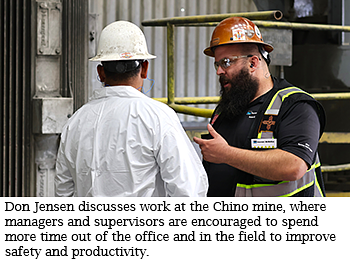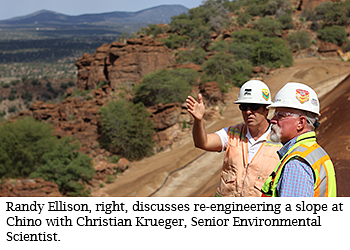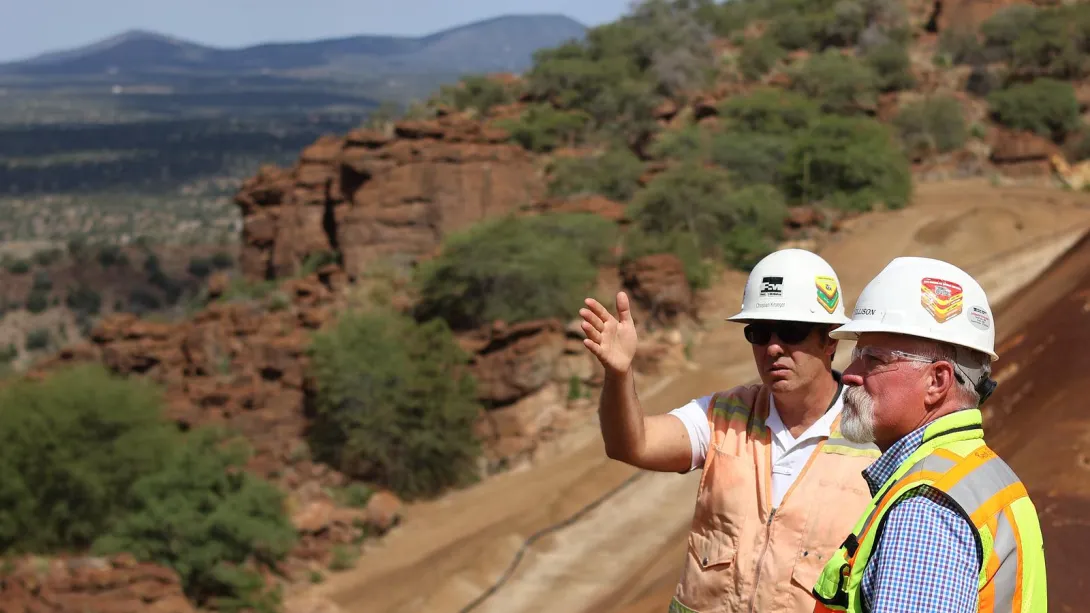A lot of ankles were getting twisted at the Chino mine, so General Manager Randy Ellison sent his management team and frontline supervisors on a mission:
Check everyone’s boots.
While simple and not very sexy, it seems to be working. Reportable injuries and safety incidents are way down. Slips, trips and falls typically account for about half of all injuries at the site. Making sure everyone had proper footwear, along with removing any long-standing slipping or tripping hazards, was an immediate task to address the problem.
 The success is part of a push to get supervisors out from behind their desks and into the field face-to-face with employees to improve safety and operational efficiency, Ellison said.
The success is part of a push to get supervisors out from behind their desks and into the field face-to-face with employees to improve safety and operational efficiency, Ellison said.
Sitewide meetings with managers and frontline leaders are held via Teams Monday and Friday starting at 7:30 a.m. All other days, there is a “No-Fly Zone” for scheduled meetings between 6 and 10 a.m. to allow supervisors at all levels to spend quality time with their people outside the office.
The No-Fly Zone concept pioneered at Chino has been so successful that it is being implemented with some site-specific customization at Tyrone, Safford and Cerro Verde.
Miami developed a similar approach on its own in May 2022 to address safety performance and drive more employee engagement. At the Miami smelter, meetings are prohibited on Tuesdays from 8 to 9 a.m. and on Thursdays from 8 to 10 a.m. to give leadership more time in the field, said Michael Cross, Manager-Operations Support.
Safety fuels discussions
Safety was the driving force in developing the No-Fly Zone at Chino. During a companywide general managers call last fall, there was discussion about workplace distractions that compromised safety. Unacceptable safety performance in the past several quarters has been a company concern.
The meeting prompted a discussion at Chino as to how managers and supervisors are spending their time, Ellison said. It turns out they were spending too much of it in meetings or on calls that kept them in the office and not out in the field where the work was being done.
 Ellison and his team came up with the concept of the No-Fly Zone to help re-engage supervisors with their people. That was particularly important coming out of the pandemic when face-to-face interaction and hands-on mentoring was difficult, if not impossible, he said.
Ellison and his team came up with the concept of the No-Fly Zone to help re-engage supervisors with their people. That was particularly important coming out of the pandemic when face-to-face interaction and hands-on mentoring was difficult, if not impossible, he said.
“It’s a purposeful exercise to go see, learn and really redefine what good looks like,” Ellison said. “It’s not just in a safety arena but also how you interact with people, how you engage people, how you hold people accountable. That time in the field is for you to go learn, teach, inspect, do and lead by example.”
Initially the directive was for managers and supervisors to spend mornings with their people but with little direction as to what they should be doing, Ellison said. That wasn’t particularly effective, so he started giving them specific tasks for the month. The first was to check everyone’s boots.
The results so far are encouraging. The first quarter of 2023 was Chino’s worst in at least 12 years, with 10 reportable injuries. So far this quarter, with the supervisors spending more time in the field, there have been two.
Communication essential
Getting all layers of leadership with their frontline crews is especially important at the beginning of the shift, said Don Jensen, Concentrator Manager-Chino. That tends to be when workers are setting up their safety equipment like barricades and preparing the job site for the day’s tasks. Having experienced supervisors checking the precautions is an added layer of protection to help ensure safety procedures are followed, and there are no hidden hazards that might go unnoticed by frontline workers focused on the job itself.
Other sites have adopted their own versions of this no meeting concept.
Safford reserves time on Thursday morning for site leaders to be in the field to be visible to and to have conversations with employees, said Vicki Seppala, General Manager. They also have the flexibility to spend as much time out of the office as necessary. The time is not just about safety “but without a doubt safety is one of the key focuses,” she said.
“This time allows site leaders to conduct value-added conversations about elements that impact our work – safety, environment, people, quality, cost, continuous improvement and meeting our business objectives,” Seppala said.
At Cerro Verde, managers and other supervisors on the operations team, particularly in the C2 concentrator, are asked not to schedule meetings from 7:30 to 9:30 a.m. Supervisors are expected to be in the field interacting with their crews, particularly on safety issues, and to plan that day’s work, said Ed Rybinski, Manager-Concentrator. After a challenging year for injuries in 2022, the no meeting concept was introduced in the concentrator operations at Cerro Verde in November, and there has not been a reportable injury there since.
“Is this the only reason? No,” Rybinski said. “But I firmly believe it is helping.”
